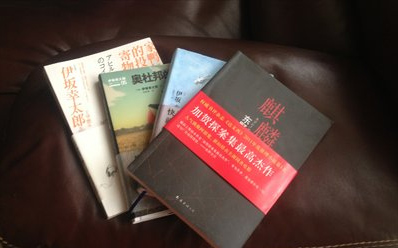 Serena Williams beats Poland's Rybarikova 2-0 at 2013 Rogers Cup
Serena Williams beats Poland's Rybarikova 2-0 at 2013 Rogers Cup
 Parade held to mark Havana Carnival
Parade held to mark Havana Carnival
 3 Chinese citizens killed, 2 missing in Kabul
3 Chinese citizens killed, 2 missing in Kabul
 Incredible photographs of Denver weather
Incredible photographs of Denver weather
 China's first night zoo opens in Kunming
China's first night zoo opens in Kunming
 Geopark in Guangxi sees tourism peak
Geopark in Guangxi sees tourism peak
 Air Forces arrive at designated area to join China-Russia drill
Air Forces arrive at designated area to join China-Russia drill
 Industrial growth gaining momentum
Industrial growth gaining momentum
 2013 Taipei Musical Firework Festival kicks off
2013 Taipei Musical Firework Festival kicks off
 |
| A large number of Japanese deductive-reasoning novels have been translated into Chinese. (GT/Liao Danlin) |
Deductive-reasoning fiction, originally developed from detective novels, has become the most popular genre of Japanese literature. With the deductive-reasoning culture spreading from Japan to China through literature, cartoons, television series and films since the beginning of the century, the number of Chinese fans as well as writers is growing fast. And August is filled with new arrivals and surprises for fans of deductive-reasoning fictions.
Chinese mystery writer Cai Jun recently released his new book Shengsihe (The River of Life and Death), which was seen as a Chinese social sect, a style of mystery that focuses on social background, searching for social causes of criminal behaviors.
Also in this month, the long awaited Simplified Chinese version of Keigo Higashino's The Wings of the Kirin is published. Promoted as the best piece of Keigo's detective Kyouichirou Kaga series, 9 million copies have been sold in Japan so far.
Almost at the same time, the Soji Shimada prize for deductive-reasoning novels, which was founded in Taiwan and awards the best Asian work in the genre every year, has announced its nominations.
For the first time, Chinese mainland writer Lei Jun's Jianguide Aiqing (Damned Love) has made to the top three.
Puzzle pieces
Book critic Zhu Tong told the Global Times that deductive-reasoning fiction is a broad concept in Japan, and is more than the "detective or mystery" novels that many readers are familiar with.
Although the genre bares similarities to mystery, it sometimes includes elements from science fiction or fantasy and puzzle solving in daily lives. It is a result of the fully developed genre and the marketing requirements in Japan.
Zhu explained that for example, if in a story there is a person who holds an umbrella in heavy rain but does not use it or if someone gives red flowers at a funeral when everyone else sends white flowers, the work would still be classified in the genre as long as it logically solved the puzzle even if no one is subsequently murdered.
For Zhu, such smaller puzzles make the genre lighter and more elegant than the traditional crime-centered detective fictions.
 |
 Air Force's combat group conducts flight training in joint drills
Air Force's combat group conducts flight training in joint drills Pakistan's rain-triggered accidents claim 29 lives: media
Pakistan's rain-triggered accidents claim 29 lives: media More Chinese stores ban bear bile
More Chinese stores ban bear bile Top 10 most dangerous jobs in the world
Top 10 most dangerous jobs in the world Weekly Sports Photo: Beauty of Nine Ball; world's 'tallest' couple
Weekly Sports Photo: Beauty of Nine Ball; world's 'tallest' couple Models wear fur clothing in high temperature for ads
Models wear fur clothing in high temperature for ads Day|Week|Month